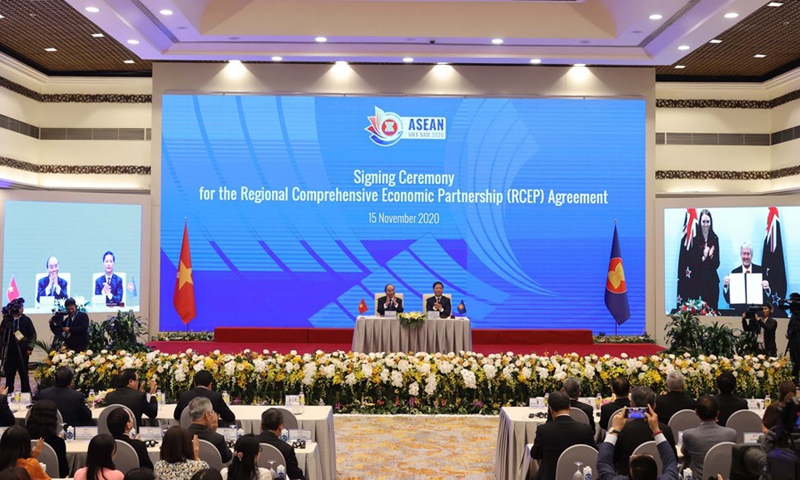
The signing ceremony of the Regional Comprehensive Economic Partnership (RCEP) agreement is held via video conference in Hanoi, capital of Vietnam, November 15, 2020. Photo: Xinhua
The signing of the world's largest free trade agreement - the Regional Comprehensive Economic Partnership (RCEP) - sent many Asia-Pacific stock markets soaring on Monday, as investors anticipated that the deal would inject vitality into markets, fueling post-pandemic economic recovery in the region.
Asian markets mostly gained in early trading on Monday morning. The Japan-based Nikkei 225 index edged up by 1.1 percent at opening and widened the rise to 1.65 percent as of press time. Likewise, the Korea Composite Stock Price Index rallied by 0.69 percent at opening, and soared to a new high since 2018 with a 1.8 percent gain as of press time.
The Chinese mainland markets also rose at the news of the RCEP at opening, with certain transportation and port related shares soaring in particular. The Shanghai Composite Index rose by 0.47 percent at opening; the Shenzhen market up by 0.42 percent, while the ChiNext board edged up by 0.34 percent.
Certain trade and port related shares soared on the mainland boards. Shares of Jinzhou Port touched the trading limit of 10 percent shortly after opening. Bohai Cruise Co also saw its share price hit the trading limit.
The Shenzhen and ChiNext boards went through some fluctuation though, easing early gains to fall into the red within minutes after opening but rising again approaching end of the morning session. As of press time, the Shanghai market edged up by 0.71 percent to 3333.59 points, the Shenzhen market up by 0.19 percent to 13,780.80 points, while the ChiNext up by 0.13 percent to 2,710.24 points.
On Sunday, 15 countries including China, Japan and South Korea signed the RCEP to form the world's largest trading bloc that covers nearly a third of the global economy.
Li Daxiao, chief economist at Shenzhen-based Yingda Securities, said that the Asia-Pacific stock markets' rise showed investors anticipation of a "moderate economic recovery" in the region as stimulated by the signing of the RCEP trade agreement.
"People are expecting that the deal could give rise to closer regional cooperation, which will drive up the economy and push trade interaction. This, plus a general low interest rate environment, is sending the stock markets higher," Li told the Global Times.
However, the mainland markets didn't secure a rise as solid as in other Asian markets, as the markets are still in a phase of "gathering momentum" after a wave of steep rises around July.
"The influence of RCEP is certainly positive on the mainland markets, but negative forces also exist, such as rising IPOs and a trend of decreasing stock holdings by listed companies' senior management staff, so the overall stock performance will be balanced and subdued compared with neighboring markets," Li said.
Global Times

